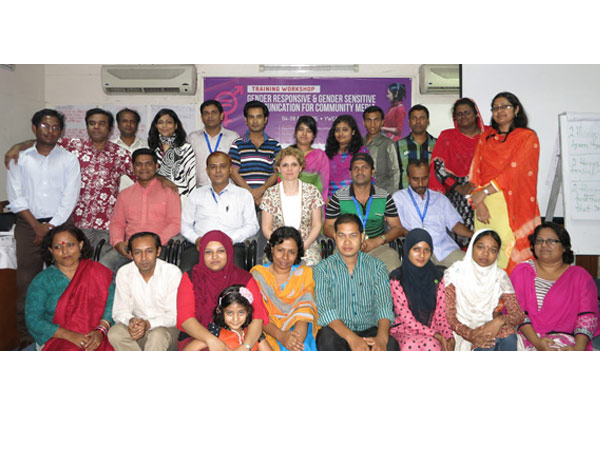“Government is very keen to create access to information and enabling environment for the people to freedom of expression. Already our government has allowed 11 community radio stations to transform their present capacity of 100 watt transmitter to 250 watt. This is no doubt the acceptance of community media as a whole. I am confident that community television will also come into the light.”-said Mr.Nasiruddin Ahmed ,Joint Secretary(Broadcast) , and Secretary, Central Monitoring Committee, Community Radio, Ministry of Information. He was speaking as the Chief Guest in the closing ceremony of five-day long training workshop on 8 April at YWCA Auditorium, Dhaka. The five daylong training workshop on ‘Gender Responsive & Gender Sensitive Communication for Community Media’ has been started here on 4 April, 2015.Bangladesh NGOs Network for Radio and Communication (BNNRC) organized the event in collaboration with Free Press Unlimited with the support from European Union. In her speech as Special Guest of the closing session Dessi Damianova, Program Manager, South Asia, Free Press Unlimited reassured the community radio participants the continued support of FPU in contributing their works from Gender Equality to Gender-Equity by utilizing community media effectively. Svetlana Dimitrova, Trainer, Gender Equality and Communication skills who facilitated the five-day long training workshop wished their success in future .The participants presented their learning and future action plans, which they have developed through future workshop.
A total of 22 representatives participated in the workshop. They represented from 16 community radio stations, organizations like BNNRC and Steps towards development. The training was aimed to build awareness, efficiency and knowledge creation on gender responses among the participants and to use increased/ developed knowledge in practice and implementation for the effectiveness as well as positive change regarding gender responsive and sensitivity in society. The workshop was an effective mix of both theoretical and practical sessions covering the subjects like basic communication skills, gender sensitivity, gender-audit in media contents etc.
Community Radios in the country were launched in 2011 with a vision to express rural peoples’ voices, ensuring women and gender development, Right to Information, Disaster Risk Management, Rural development etc. while Bangladesh NGOs Network for Radio and Communication (BNNRC) has been playing pioneering role from establishment to nourishing community media for effective rural development.

By bnnrc
AHM Bazlur Rahman-S21BR is Chief Executive Officer and founder Secretary of Bangladesh NGOs Network for Radio and Communication (BNNRC). He has more than 20 years experience in leveraging community media and right to communication to create successful policy advocacy in Bangladesh in line with community media development. His areas of expertise straddle community media policy advocacy, training, project management especially in the area of community media.
He founded Bangladesh NGOs Network for Radio and Communication (BNNRC). BNNRC Devoted Entirely to Promote Community Media for Development (CM4D). BNNRC Leads Supports and Advocates for the Initiators to actively provide independent community broadcasting in Bangladesh since 2000. BNNRC represent the community electronic media sector to Government, Industry, Regulatory Bodies, Media, Academia and Development Partners from 2000. The BNNRC provides leadership and support for rural initiators to facilitate independent electronic community broadcasting services and to build and strengthen rural communities.
He actively works to improve recognition of the community electronic media sector [Community Radio | Community TV | Community Film] & its work in and involvement with the communities it seeks to serve. BNNRC's outreach extends to local, national and international forums for communicating Knowledge for Development (KM4D). In this backdrop, communication is recognized as an essential human need and, therefore, as a basic human right. Our working strategies are:
1. Communicating on the Public Sphere: The role of communication and media in exercising democratic political participation in society
2. Communicating Knowledge: The terms and means by which knowledge generated by society is communicated, or blocked, for use by different groups.
3. Civil Rights in Communication: The exercise of civil rights relating to the processes of communication in society &
4. Cultural Rights in Communication: The communication of diverse cultures, cultural forms and identities at the individual and social levels.
BNNRC now strives for the following core interventions to contribute in achieving 6th five Years Plan, UN World Summit on the Information Society (UN WSIS) Action Plan and Millennium Development Goals (MDGs) through:
Right to Information- RTI for ensuring improved livelihood of the marginalized
ICT for Development- ICT4D for Bridging the Digital Divide in rural areas &
Community Radio/Community TV/ Community Film for amplifying voices for the voiceless and Amateur Radio for Disaster Risk Reduction
He graduated from University of Dhaka and Post graduated from Asian University of Bangladesh in the field of Social Science (MSS) in Government & Politics and Participated in certificate course on Development Management by Participatory Research in Asia (PRIA) New Delhi, India
He currently founder member of Bangladesh Working Group on UN World Summit on the Information Society (UN WSIS) headed by Bangladesh Government, Community Radio Monitoring Committee of Ministry of Information, People’s Republic of Bangladesh, founder member of Bangladesh UN Internet Governance Forum( UN IGF) Headed by Minister, Ministry of Information, Multi-stakeholder Steering Group Members of Asia Pacific Regional Internet Governance Forum (AP-RIGF) & Distinguish Fellow, Center for e-Parliament Research. Contact: ceo@bnnrc.net www.bnnrc.net
View all of bnnrc's posts.
